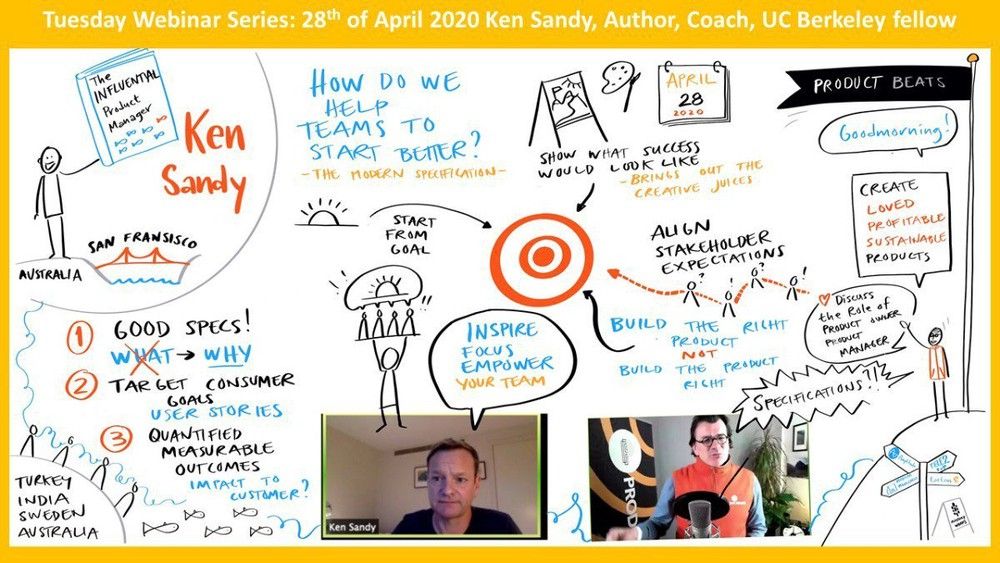Episode 6: Product Requirement Specification w/Ken Sandy
28 April, 2020 / Host: Magnus Billgren
The Relevance of Product Requirements Specification in Agile Product Development
Product Management in the 21st century has come a long way since the birth of the concept. One of the earliest frameworks for Product Management was Market Requirement Specification (MRS) and Product Requirement Specification (PRS), which provided a structured approach to product development. However, with the rise of Agile methodologies, the concept of specification has been killed and expelled from the Product Management community. But is the concept really dead? Not according to Ken Sandy, who brought it back to life in his book, "The Influential Product Manager."
In this episode of ProductBeats, Ken Sandy joins the show to talk about his Hypothesis-driven Specification framework and why he thinks there is a second life for the SPECIFICATION as an anchor for the Backlog and Roadmap.
In this episode of ProductBeats, Ken Sandy joins the show to talk about his Hypothesis-driven Specification framework and why he thinks there is a second life for the SPECIFICATION as an anchor for the Backlog and Roadmap.
The Importance of Specification in Product Management
Ken Sandy argues that while the term specification may have fallen out of favor with Agile practitioners, it still serves a critical purpose in product development. A specification provides a starting point for development and a framework to stimulate creativity. Without a specification, Backlogs and Roadmaps can become independent objects that introduce feature creep and lead teams away from the original goal.
According to Ken Sandy, a Hypothesis-driven Specification is a new type of specification that focuses on desired business outcomes and problems to solve. It provides a clear and measurable goal for product development teams, ensuring that they stay on track and prioritize their backlog efficiently.
In his own words, "The Hypothesis-driven Specification focuses on the problem you are trying to solve and the outcomes you want to achieve. It's a way of thinking about what you want to build and why you want to build it."
According to Ken Sandy, a Hypothesis-driven Specification is a new type of specification that focuses on desired business outcomes and problems to solve. It provides a clear and measurable goal for product development teams, ensuring that they stay on track and prioritize their backlog efficiently.
In his own words, "The Hypothesis-driven Specification focuses on the problem you are trying to solve and the outcomes you want to achieve. It's a way of thinking about what you want to build and why you want to build it."
The Benefits of Using a Hypothesis-driven Specification
Ken Sandy's Hypothesis-driven Specification framework has several benefits for product development teams, including:
- Clear and measurable goals: The framework provides a clear and measurable goal for product development teams, ensuring that they stay on track and prioritize their backlog efficiently.
- Focus on outcomes: The framework encourages teams to focus on desired business outcomes and problems to solve, rather than just features or technical requirements.
- Flexibility: The framework is flexible enough to accommodate changes in customer needs and market dynamics, allowing teams to pivot when necessary.
- Collaboration: The framework encourages collaboration between product managers, designers, and developers, fostering a culture of innovation and creativity.
"The Hypothesis-driven Specification is a tool for collaboration. It's not just about the product manager writing a specification and throwing it over the fence to the development team. It's about working together to define the problem, understand the customer, and build a solution that solves the problem and achieves the desired business outcomes."
The Second Life of Specification
Despite its fall from grace in the Agile community, Ken Sandy believes that the SPECIFICATION still has a second life as an anchor for the Backlog and Roadmap. He argues that while the term may have been killed, it still serves a vital purpose in providing a starting point for development and a framework for creativity.
As Ken Sandy puts it, "The Hypothesis-driven Specification is a living document that evolves with the product. It's not something that you write once and forget about. It's a tool for continuous improvement, a way to measure progress and ensure that you're on the right track."
If you're interested in learning more about Product Management and the latest frameworks and methodologies, check out the Productbeats Product Management Certification Program. This comprehensive program covers everything from ideation to product launch, providing you with the skills and knowledge you need to become a successful Product Manager.
You might also enjoy watching...
Copyright © 2026 ProductBeats AB

Get The Program Brochure
Submit the form below to have The Program Brochure delivered to your inbox
The title of the notification
The descriptive text of the notification


